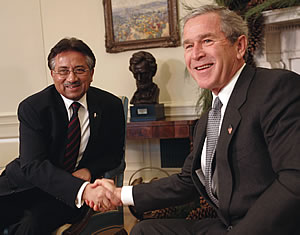Fight disinformation:
Sign up for the free
Mother Jones Daily newsletter and follow the news that matters.

Pakistani President Pervez Musharraf, the main US ally in the war on terror, resigned today under threat of impeachment. The news has Washington’s nerves on end for a number of reasons, not least of which is that Pakistan is a nuclear-armed country in a volatile neighborhood, plagued by Islamic militants, and which has in the wings no obvious successor to Musharraf to help keep everything from unraveling.
Pakistan has long been the center of US attention when it comes to fighting Al Qaeda. Now, with Musharraf gone, the strategic alliance between the two will become all the more delicate and uncertain. It’s one that Washington must not allow to go sour. According to a survey released today by Foreign Policy and the Center for American Progress, 69 percent of foreign policy experts polled now believe that Pakistan is the nation most likely to transfer nuclear weapons technology to terrorists; just 35 percent thought so last year. (Thanks to A.Q. Khan, it’s already the world’s leading distributor of the stuff to states seeking nuclear weapons, like Iran and North Korea.)
That said, all is not doom and gloom. For the first time in its (albeit short) history, the Foreign Policy survey finds that experts are feeling positive about recent developments in the war on terror. From a press release announcing the survey’s results:












